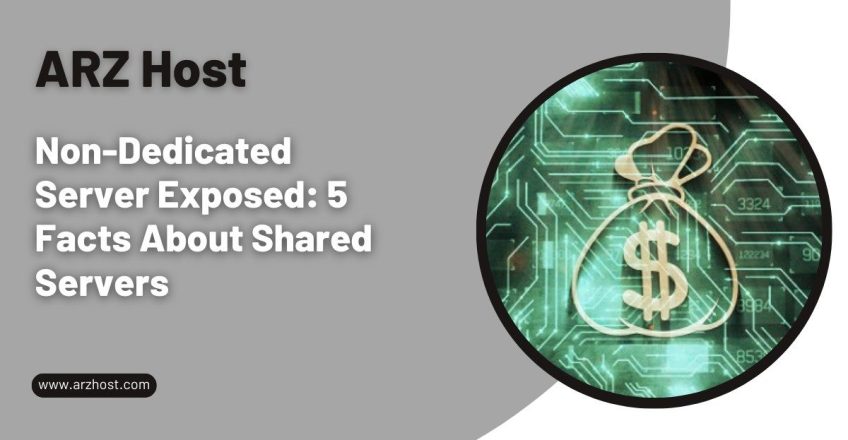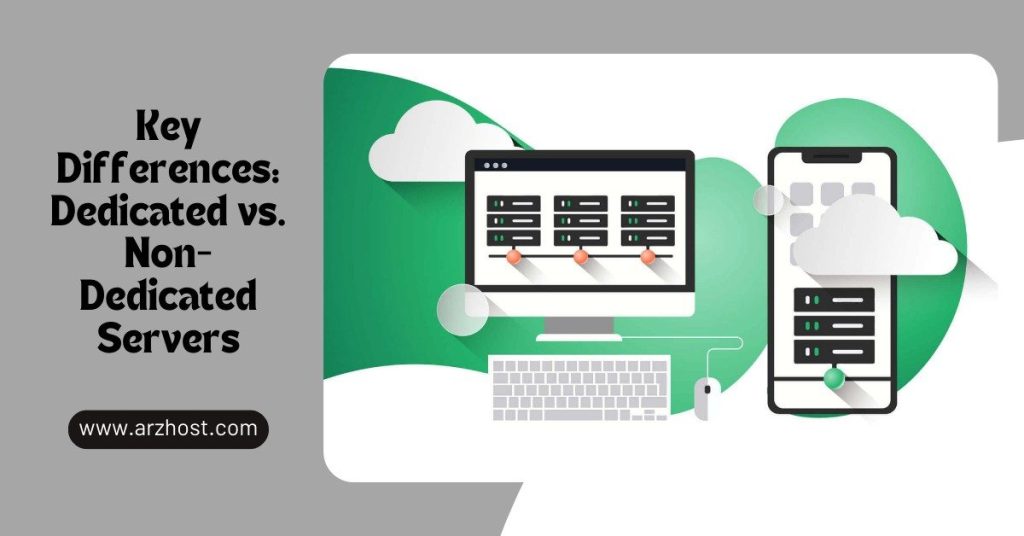
In non-dedicated servers, the resources, including CPU, memory, bandwidth, and storage are shared with other users. Your site shares a common physical server with a number of other sites. That’s how shared hosting works. The same applies to VPS and public cloud servers. They also run on shared hardware. That’s what keeps the price down. You don’t have to mess with server maintenance either; the hosting provider handles most of it.
That kind of setup works fine for personal sites, small businesses, or anyone just starting out. But there’s a catch. Since CPU and bandwidth aren’t just yours, things can slow down. Let’s say someone else on the server starts using up a ton of processing power. Your site gets pushed aside. That’s the noisy neighbor issue. If one site gets compromised, yours might be in trouble too. There’s not much isolation between accounts. Data isolation is limited.
Dedicated servers avoid all that. You have full access to the CPU, memory, storage and bandwidth. Dedicated server hardware often adds enterprise grade CPU (e.g. Intel Xeon or AMD EPYC), ECC memory and RAID-configured storage which is more reliable and will also perform well with heavy workloads.
Dedicated servers will survive traffic spikes. That’s why people running busy ecommerce shops, finance apps, or game servers stick with them. You get the entire package, including CPU, RAM, storage, and bandwidth. However, it does cost more, and you’re responsible for the backend. Maintenance, remote access tools like IPMI, and setting up the OS are all on you.
So what matters more to you: saving money or having full control? Non-dedicated setups are simpler. Dedicated servers give you all the power, but you’ve gotta know what you’re doing.
Shared or virtualized servers are non-dedicated servers which operate several users on a physical machine. There is a shared CPU, RAM, storage and bandwidth. Your site can slow down in case another person is causing a lot of traffic or overloading the processing power. It all depends on what’s going on around you.
In setups like this, you never get full control over the server. Even with a VPS or cloud server where you might get guaranteed resources, you’re still sharing the bigger machine. That keeps costs low, but you lose some consistency. Performance can jump around, and you don’t always know who else is in the same box.
Dedicated servers work differently. You get all the CPU, memory, and bandwidth to yourself. Full root access, full control. A dedicated server gives you the option of the operating system of your choice, the ability to install server software yourself and customize it to your requirements. On a non-dedicated setup, you work within a shared system. Your options are limited, and most of it is not yours to control.
These types of servers are best suited for lighter workloads, smaller sites, or those who need to save money. But you give up some performance and control to get that lower price.
Scale Your Business with VPS
Dedicated Resources, Affordable Price: Sign Up for VPS Hosting.
Click HereA multi-tenant architecture is applied in non-dedicated servers. This implies that multiple individuals use the same physical device. All the users sharing a given server share CPU, RAM, storage and bandwidth. Thus, your application or web site shares the offered processing power, depending on the use by everyone else, as well.
How resources are split depends on the setup. With shared hosting, you are basically all in the same pool, and there’s no real guarantee of how much CPU or memory you’ll have at any point.
A virtual private server (VPS) is more organized. You get your own allocation of CPU cores, RAM, storage, and usually a dedicated IP address, even though the underlying hardware is still shared. Cloud servers go even further. They use a cluster of physical servers, which allows you to scale your CPU, memory, or storage up or down as needed and only pay for what you use.
Most of the backend stuff is handled by the hosting provider. They’ll manage software patches and updates, backups, physical server management, network hardware management, and security issues. You are not the one installing server software or setting up the Operating System. You don’t have to touch the network config either.
There are several obvious strengths of non-dedicated servers which make them a good option to small business owners, personal websites, and startups.
There are a number of undoubted benefits of non-dedicated servers, which makes them a good fit to small businesses, personal websites, and startups.
All of that should be taken into account when making your decision. Non-dedicated hosting can save money and time, but you need to know where it falls short.
Dedicated servers are reasonable when you prefer to spend little and do not require extreme heavy-powered features or resources.
They suit small businesses or start-ups that simply want to easily and cheaply get online.
Shared infrastructure is unlikely to be reliable if your site is receiving high traffic and requires high-speed and reliability.
All this boils down to what is more important. When cheap and simple to set up are the focus of cost and ease of set up surpass control, security or performance, non dedicated servers are a good point to begin with.

Being aware of what makes the difference in these two kinds of servers will enable you to decide which one can satisfy your needs.
Resource Control and Allocation
With a dedicated server, you will own all of the CPU, RAM, Storage And Bandwidth and do not have to share. You can expect a consistent level of performance regardless of what another user does to the same machine. On a non-dedicated server, the same resources are split between multiple users; if one user is using a lot, you will notice it.
Performance Expectations
Dedicated servers remain consistent even at the times of traffic spikes. This gives them well suited to high traffic websites, game sites or extensive databases. Lightweight projects might be well suited to non-dedicated servers, but they can be slow during burst periods as they are being used by more than one user.
Security Levels
A dedicated server keeps your particular environment isolated. You are not sharing resources and do not have other users operating on the same machine, which can lower the risk of a data leak or external interference. Non-dedicated servers contain more exposure; other users share the resources with you and may introduce outside influences.
Cost Comparison
The non-dedicated servers are cheaper since they share common resources. This is why non-dedicated servers are well used when starting up, blogging, or having a small group. Dedicated servers cost more because you’re paying for all the control and private access to the hardware.
Use Case Scenarios
Choose non-dedicated if you’re just getting something new started.When you do not require tight security or high-end performance and you are running a small site, then a non-dedicated server is what you want. Use select when you need custom tools, need root access, or working with sensitive data.
However, the table presented below provides a brief comparison of the key differences between dedicated and non-dedicated servers:
| Aspect | Non-Dedicated Servers | Dedicated Servers |
| Resource Control & Allocation | You share CPU, memory, and storage with other users | Full access to CPU, RAM, storage, and bandwidth |
| Performance Expectations | Can slow down if other users are using too much | Fast and steady, even under heavy load |
| Security Levels | Shared setup means more potential for security issues | Physically isolated setup with stronger data protection |
| Cost | Cheaper because the cost is split with others | More expensive since you’re paying for everything yourself |
| Use Cases | Good for blogs, test sites, small businesses, or side projects | Great for ecommerce, big apps, databases, or secure workloads |
A few things actually matter when picking one:
When you’re comparing hosts, these are the things to look at:
The trick is to select a plan that satisfies what you require at this moment but at the same time allow you to expand.
If you’re not going with a dedicated setup, you still want hosting that actually holds up. Doesn’t matter if it’s shared or VPS, what matters is how the provider manages the underlying hardware, support, and traffic spikes. Some are decent, others will have you pulling your hair out.
Secure Your Dedicated Server Today
Experience Power with Dedicated Servers – Free Setup with the server.
Click HereNon-dedicated servers provide a cheap entry point into the world of being online, and CPU, RAM, storage and bandwidth are shared among a group of users. These are relatively easy to install and set up and they are maintained, backed up and updated by providers. Scalability (especially on cloud-based services) can be scaled to your needs.. In the majority of shared hosting and VPS configurations, however, the underlying server hardware remains based on powerful multi-core processors and SSD-based storage arrays, yet those physical resources are parted out amongst a large number of accounts.
However, as resources are shared, there can be variation in performance and both security and customization are riskier than those of dedicated servers.
The non-dedicated server would be a good choice in case you have a small to medium website or you have a start up that is operating with a budget, or is a project with average traffic and average level of security. When your site requires enhanced performance, enhanced control or full data isolation, then a dedicated server would be the improved choice.
What is important is that you pause and consider your projected traffic, budget, security requirement, and the level of control you desire. In case you are not sure, consult someone who has experience in hosting. It aids in getting the proper setup, and you do not have to figure it out later.
Since your CPU, RAM, storage, and bandwidth are shared with others, the spike of traffic or heavy-resource apps of one user may slow down your site. It is referred to as the noisy neighbor problem. It is capable of influencing your load times and rendering performance less predictable.
Usually, yes. The vast majority of hosting companies allow you to change plans once you are ready. The migration may entail a transfer of data, modification of a few settings, and directing your domain to the new server. On the managed hosting, then they usually do a lot of that.
They can work well in a small shop or store that does not have lots of traffic. However, when you are processing payments, storing customer data, or need higher load speeds, non-dedicated hosting may not work. Larger stores or risky data configuration require the extra security and protection of a dedicated server.
Devoted servers are closed. You are not sharing space or traffic with anybody and this makes them safer in general. With a non dedicated server, you are more vulnerable as you are sharing the environment. This is why one should double their efforts on backups, monitors, and firewalls.
Light stuff that does not require constant high performance can work well. Consider blogs, personal portfolios, smaller business websites, testing websites, or start-ups. Anything that is excessive will begin to reach limits quickly.
They are capable of it depending on the arrangement. When you are on a cloud-based plan, there are those providers who can allow you to tap into more resources when required. This is not so good with shared hosting, though. Performance may suffer or throttle when there is a big traffic jump.
It depends on the plan. The least control is with shared hosting. You are never really able to install custom software or go about altering the Operating System. Cloud hosting and also VPS provides additional flexibility, such as root access or even custom settings.. However, Never as open as dedicating a server to yourself.
Read more: